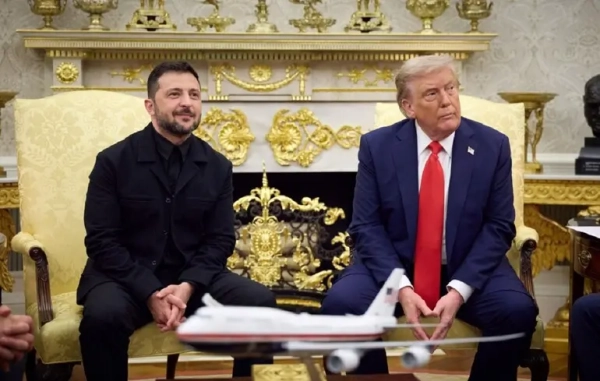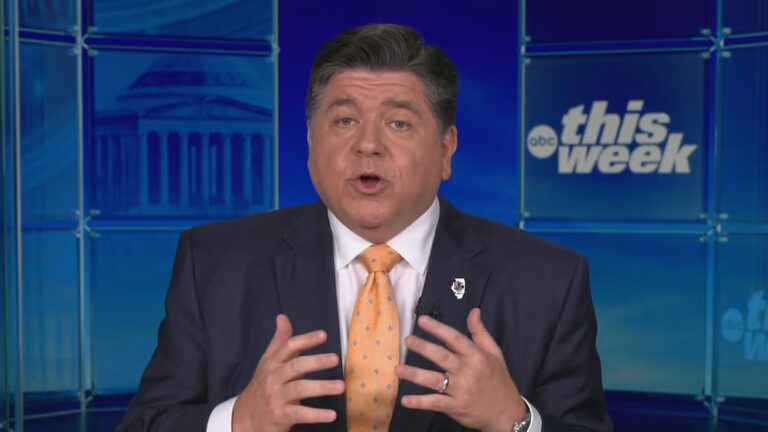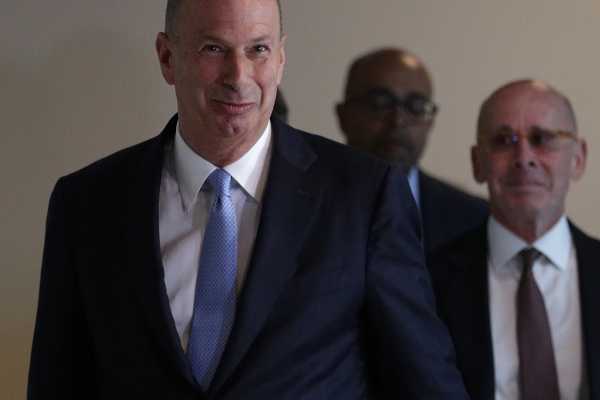
One of the main players under investigation in the House impeachment inquiry used his opening testimony to lawmakers Thursday to throw Rudy Giuliani, President Donald Trump’s personal lawyer, under the bus.
Gordon Sondland, the US ambassador to the EU, delivered an 18-page written statement to congressional investigators in advance of hours of questioning. He’ll be asked about the Trump administration’s effort to get Ukraine to launch an investigation into Joe Biden’s family in exchange for US military aid and a meeting between the two countries’ presidents. Trump falsely believes Biden used his power as vice president to stop a corruption probe into Burisma, a Ukrainian gas company Hunter Biden — Joe’s son — sat on the board of.
Sondland is a key figure in the drama, as text messages revealed earlier this month showed the ambassador working with Giuliani and top US officials to coordinate the White House’s Ukraine policy. But his main message to Congress in his prepared opening statement was that he had merely aimed to faithfully execute the administration’s policy involving normal, non-corrupt relations with Ukraine. The only one pushing anything about Burisma, Sondland claims, was Giuliani.
Sondland also claims Giuliani clearly tied a possible meeting between Trump and Ukrainian President Volodymyr Zelensky with Ukraine opening a probe into Burisma as part of a “deliverable” Trump wanted from the country. Importantly, however, Sondland doesn’t say Trump himself purposefully did anything wrong.
But the main narrative is that Sondland is innocent of any wrongdoing and that anything inappropriate came from Giuliani — likely in hopes that the former New York City mayor gets a nice view of a public transport vehicle’s underside.
Here are the key parts of Sondland’s Thursday opening testimony that you need to know.
Trump wanted Giuliani to help lead Ukraine policy
Sondland makes the case that Trump wanted Giuliani intimately involved in carrying out the administration’s Ukraine policy.
Sondland describes a May 23 meeting he and other US officials had with Trump and his aides about organizing a phone call and meeting between Trump and Zelensky. “President Trump was skeptical that Ukraine was serious about reforms and anti-corruption, and he directed those of us present at the meeting to talk to Mr. Giuliani, his personal attorney, about his concerns,” Sondland says.
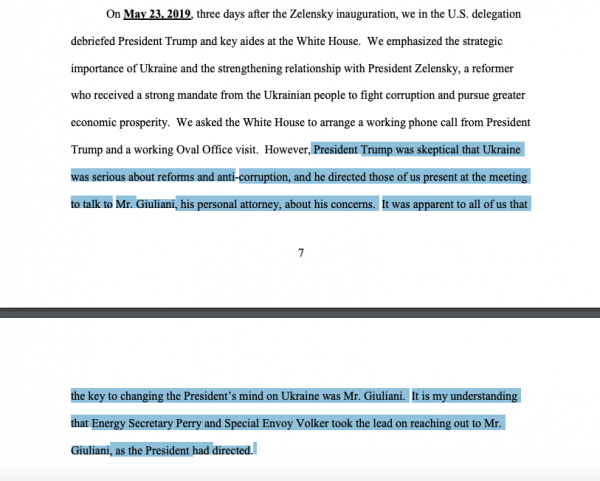
Sondland says that those in the meeting — including Energy Secretary Rick Perry and then-Special Envoy for Ukraine Kurt Volker — didn’t like that, as they wanted Ukraine policy to remain in official channels. But, the ambassador explains, they all chose to comply with the president’s command.
“Based on the President’s direction, we were faced with a choice: We could abandon the goal of a White House meeting for President Zelensky, which we all believed was crucial to strengthening US-Ukrainian ties and furthering long-held US foreign policy goals in the region; or we could do as President Trump directed and talk to Mr. Giuliani to address the President’s concerns. We chose the latter path,” Sondland said.
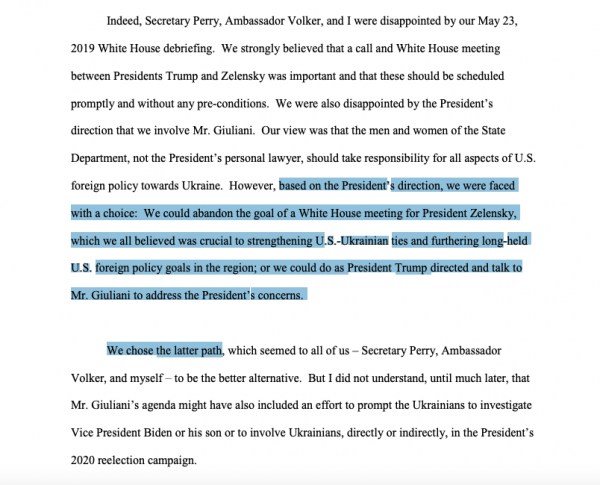
This is important: Sondland is testifying that Trump explicitly delegated Ukrainian policy to Giuliani. And the only way to get the Trump-Zelensky meeting Sondland and others wanted was to work with the president’s personal lawyer on the president’s concerns — otherwise, they would have to “abandon” any hopes of a meeting.
And, as Sondland lays out, those “concerns” involved the Bidens.
Giuliani emphasizes that Burisma is important to Trump
Describing a set of short phone conversations with Giuliani starting in May, “Mr. Giuliani emphasized that the President wanted a public statement from [Ukrainian] President Zelensky committing Ukraine to look into anti-corruption issues,” Sondland testified. “Mr. Giuliani specifically mentioned the 2016 election (including the DNC server) and Burisma as two anticorruption investigatory topics of importance for the President.”
Sondland then adds: “Mr. Giuliani does not work for me or my Mission and I do not know what official or unofficial role, if any, he has with the State Department.”
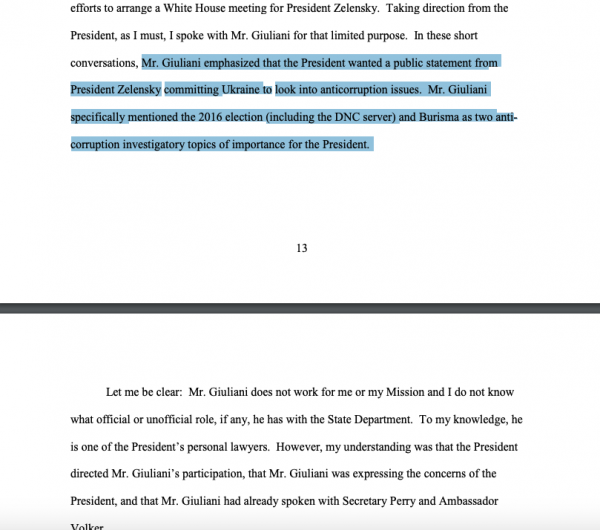
To be clear: Per Sondland, Giuliani said Trump wanted a public anti-corruption statement from Ukraine and noted that a Burisma probe was “of importance for the President.” That means that an investigation into the Bidens was at the front of Trump’s mind whenever Ukraine policy came up.
Sondland goes on to say he had no idea about Hunter Biden’s connection to the company as late as August and only learned about it through press reports — essentially trying to exonerate himself from being knowingly involved in the White House effort to get Ukraine to influence the 2020 election in Trump’s favor.
“Although Mr. Giuliani did mention the name ‘Burisma’ in August 2019, I understood that Burisma was one of many examples of Ukrainian companies run by oligarchs and lacking the type of corporate governance structures found in Western companies,” he said. “I did not know until more recent press reports that Hunter Biden was on the board of Burisma.”
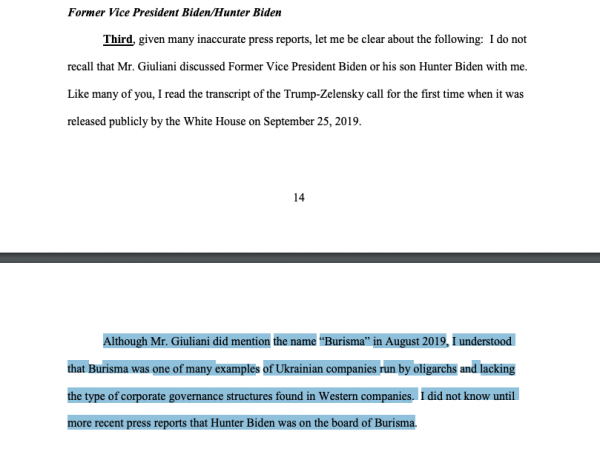
Put together, Sondland is saying that Giuliani for months pushed a Trump-backed effort to get Ukraine to commit to a Burisma investigation. That means Trump’s Ukraine policy was very clearly connected to his desire to have Kyiv dig up dirt on his 2020 rival, not a true desire to see Ukraine undertake anti-corruption reforms.
Sondland, however, says he was blissfully unaware of all of that, which is somewhat hard to believe based on how central he was to America’s Ukraine policy.
Giuliani connects a Burisma probe with a Trump meeting
Sondland describes how US officials worked with their Ukrainian counterparts to put out a public statement committing Zelensky’s government to anti-corruption efforts.
“I knew that a public embrace of anti-corruption reforms by Ukraine was one of the pre-conditions for securing a White House meeting with President Zelensky,” Sondland writes. In other words, it’s impossible to sever anything “anti-corruption”-related from getting the coveted Oval Office photo op.
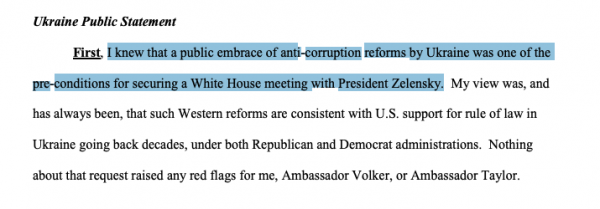
This on its own is still potentially innocuous, as the US dangles big diplomatic prizes — like a meeting with the president — in order to get what it wants all the time. (For example, before Trump became president, US officials routinely refused to allow North Korea’s leader to meet with the sitting US president until the country dismantled its entire nuclear program.)
But to understand why this is problematic, we have to go back to those revealed texts from earlier in October.
On August 9, Sondland and Volker discussed a “statement” that Trump’s people wanted Zelensky to make. It would announce that Ukraine would conduct the two investigations Trump asked for on his call with Zelensky: one into Burisma and one into Ukraine’s role in the 2016 elections. “I think potus really wants the deliverable,” Sondland texted to Volker. In other words, Ukraine doesn’t get what it wants — the meeting — until Trump gets what he wants.
That’s the definition of a quid pro quo.

Sondland’s prepared statement confirms that was indeed the “deliverable” Trump wanted from Ukraine.
“My recollection is that the statement was written primarily by the Ukrainians with Ambassador Volker’s guidance, and I offered my assistance when asked,” he writes. “This was the ‘deliverable’ referenced in some of my messages — a deliverable/public statement that President Trump wanted to see or hear before a White House meeting could occur.”
Indeed, Sondland makes the big observation that Trump had to be aware of such a statement — which surely had to include a Burisma investigation — before moving forward with planning the get-together.
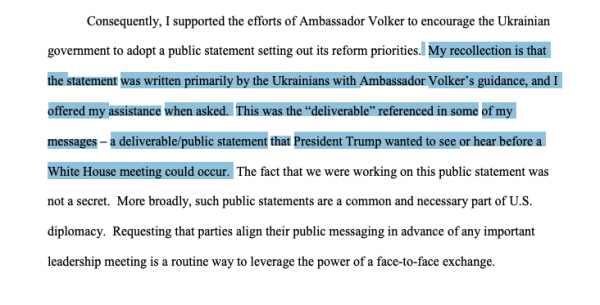
That wraps the whole scheme up. Putting together what Sondland says:
Once more for the people in the back: That is a quid pro quo.
Again, it’s not out of the ordinary to dangle a presidential meeting to get what America wants from another country. The problem here, of course, is that Trump used a probe into his 2020 presidential rival to get that meeting.
It’s worth highlighting that this is one person’s testimony, and it also behooves Sondland to pass the blame onto others. But if what he says is true, Trump placed his personal attorney in the US foreign policy machine in large part to get Ukraine to investigate the Bidens.
It doesn’t get much more openly corrupt than that.
Sondland uses his prepared statement to deny any personal wrongdoing — and to protect Trump
Sondland laying out the quid pro quo is by far the most important part of his prepared statement. But three other sections stand out from it, too.
First, Sondland is somewhat infamous for texting “Call me” in a September 1 conversation when America’s top diplomat in Ukraine worriedly asked him: “Are we now saying that security assistance and [White House] meeting are conditioned on investigations?”
That led many to believe Sondland was trying to avoid leaving a written record of a discussion of the administration’s corrupt scheme. But the ambassador insists that is a misreading of his intentions: Nothing nefarious was going on, he just really prefers chatting on the phone.
“Certain media outlets have misinterpreted my text messages where I say ‘stop texting’ or ‘call me.’ Any implication that I was trying to avoid making a record of our conversation is completely false,” Sondland asserts. “In my view, diplomacy is best handled through back-and-forth conversation. The complexity of international relations cannot be adequately expressed in cryptic text messages. I simply prefer to talk rather than to text.”
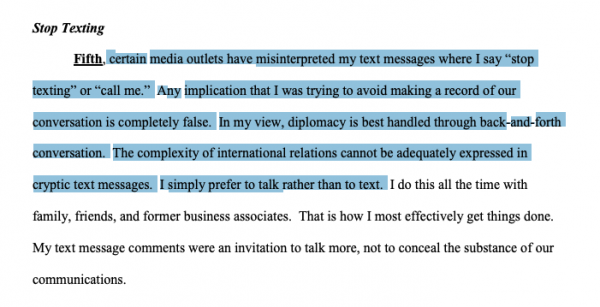
That may be true, but the text messages revealed this month do show that Sondland does also enjoy texting quite a bit. And the only few times he pushed to communicate with his voice was when matters got … let’s say “complicated.” Which means it’s entirely possible Sondland knew he was doing something wrong and is trying to explain it away by insisting he just really enjoys the gift of gab.
Second, Sondland disputes assertions that a July 10 White House meeting with Ukrainian officials was inappropriate. Earlier this week, former National Security Council (NSC) director for European affairs Fiona Hill Hill testified that she, then-National Security Adviser John Bolton, and Sondland attended the gathering that went a bit off the rails.
Per her testimony, Sondland brought up the anti-corruption investigation, leaving those in the room with no doubt that he wanted the Ukrainians to look into the Bidens. Bolton afterward told Hill to speak with top NSC lawyer John Eisenberg about his discomfort with what Sondland said and the Ukraine plan he, Giuliani, and acting chief of staff Mick Mulvaney were executing.
“I am not part of whatever drug deal Sondland and Mulvaney are cooking up,” Bolton told Hill, according to the New York Times on Monday night. Apparently, Bolton was already upset at Giuliani for his Ukraine work. “Giuliani’s a hand grenade who’s going to blow everybody up,” Hill recalled Bolton saying in a previous conversation.
Sondland, however, sees that day differently.
“If Ambassador Bolton, Dr. Hill, or others harbored any misgivings about the propriety of what we were doing, they never shared those misgivings with me, then or later,” he writes. Sondland continues:
This is important, as it calls into question Sondland’s centrality to the entire scheme. If he actually did make clear that Burisma and the Bidens had to be part of Ukraine’s efforts, then it would be yet another instance of Trump officials leaning on their Ukrainian counterparts to get them to interfere in the 2020 election.
The ambassador, though, says the meeting was just fine and that clearly there were no problems because no one told him there were. That’s certainly possible. But if Bolton and Hill felt like something untoward happened, they may not have chatted with Sondland about it solely to stay out of trouble — after all, they did go to a lawyer.
Third, Sondland doesn’t openly break with Trump anywhere in his testimony. Instead, he goes out of his way to defend the president on one big occasion, saying the president wasn’t linking military aid to Ukraine with a Burisma probe.
“To the best of my recollection, I do not recall any discussions with the White House on withholding U.S. security assistance from Ukraine in return for assistance with the President’s 2020 re-election campaign,” he said.
He goes on to describe a September 9 phone call that he and the president had about this very subject:
“Taking the issue seriously, and given the many versions of speculation that had been circulating about the security aid, I called President Trump directly,” Sondland recounts. “I asked the President: ‘What do you want from Ukraine?’ The President responded, ‘Nothing. There is no quid pro quo.’ The President repeated: ‘no quid pro quo’ multiple times. This was a very short call. And I recall the President was in a bad mood.”
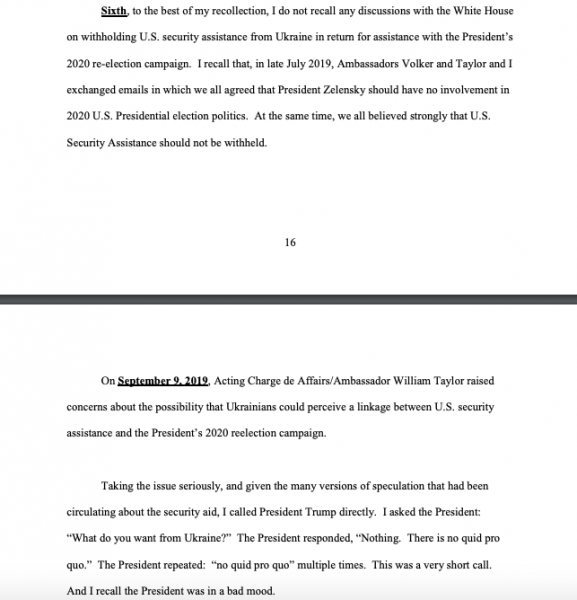
Again, this is entirely likely. Sondland may not have felt there was an explicit attempt to compel Ukraine to look into the Bidens, and Trump may not see the connection himself.
But when you put all facets of the ambassador’s opening statement together, it’s still pretty clear: Ukraine needed to commit to an anti-corruption probe to get a Trump meeting, and that investigation had to include a look into the Burisma. Sondland doesn’t say any of it is Trump’s fault, but doesn’t explain why Trump putting Giuliani at the center of it all doesn’t at least lay some of the blame inside the Oval Office.
Not too shabby for an opening statement. If that’s how the testimony starts, imagine how it might end.
Sourse: vox.com
